|
|
|
Sort Order |
|
|
|
Items / Page
|
|
|
|
|
|
|
| Srl | Item |
| 1 |
ID:
079920
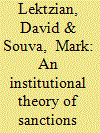

|
|
|
|
|
| Publication |
2007.
|
| Summary/Abstract |
Why do economic sanctions sometimes succeed, but often fail, to produce a policy change? The authors argue that the effect of economic punishment is conditional on a state's political institutions. In all cases, the key to sanctions success is to generate political costs for the target regime's winning coalition. However, because of different institutional incentives, economically punishing sanctions are less likely to succeed against a nondemocratic target than against a democratic target. Sanctions increase rents. This benefits nondemocratic leaders more than democratic ones. Also, nondemocratic leaders have smaller winning coalitions, so their core constituents suffer less from sanctions than democratic leaders. Additionally, the authors' strategic argument leads to novel hypotheses regarding the initiation of sanctions. They test hypotheses from their political cost argument against all dyadic sanctions cases between 1948 and 1990, using two different dependent variables and a censored selection estimator to take into account the strategic nature of sanctioning
|
|
|
|
|
|
|
|
|
|
|
|
|
|
|
|
| 2 |
ID:
085439
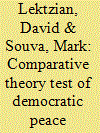

|
|
|
|
|
| Publication |
2009.
|
| Summary/Abstract |
Multiple theories posit the existence of a dyadic democratic peace. The authors extend the logic of three theories of the democratic peace - informational, normative, and preferences - and find that they make different predictions with respect to the onset and escalation of disputes across the range of similar regime dyads. First, regarding dispute onset, the preferences argument, but not the normative and informational arguments, expects autocratic dyads of similar type to have less conflict onset than mixed dyads.
|
|
|
|
|
|
|
|
|
|
|
|
|
|
|
|
| 3 |
ID:
146926
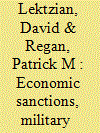

|
|
|
|
|
| Summary/Abstract |
Sanctions are designed to reduce the amount of resources available to the targeted actor and have the potential to be an effective tool for bringing disputing sides in a civil conflict to the bargaining table by altering incentives for continued fighting. Thus, there is reason to believe that sanctions can shorten the duration of civil conflicts. However, once sides in a conflict have moved to the use of violence to settle their dispute, it is hard for sanctions, in isolation, to impose enough cost to convince warring factions that settling a conflict has greater value than what could be expected from continued fighting. In this article, we argue that sanctions, in isolation, are unlikely to affect the duration of civil conflicts. However, when sanctions are combined with military interventions they can contribute to conflict management strategies resulting in shorter civil conflicts. We test our expectations empirically using data on civil conflicts from the Uppsala Conflict Data Program Armed Conflict Database and data on economic sanctions from the Threat and Imposition of Economic Sanctions Database. Our results suggest that the best hope for sanctions to shorten the duration of civil conflicts is if they are used as part of a comprehensive international response that includes institutional sanctions and military interventions.
|
|
|
|
|
|
|
|
|
|
|
|
|
|
|
|
| 4 |
ID:
106252
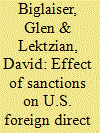

|
|
|
|
|
| Publication |
2011.
|
| Summary/Abstract |
For years, the United States has imposed economic sanctions to compel countries to alter their behavior. An important concern is whether government sanctions influence private foreign direct investment (FDI) decisions, the largest source of foreign capital. In the first study to assess empirically the relationship between economic sanctions and FDI, we consider whether U.S. sanctions influence U.S. FDI inflows into targeted countries. Using panel data for 171 countries from 1965 to 2000, we find strong evidence that U.S investors pull out of countries targeted for U.S sanctions prior to their imposition. This disinvestment is not permanent and investment tends to return after the sanctions are imposed. The results provide support for FDI studies that show the effect of risk on investor decision making.
|
|
|
|
|
|
|
|
|
|
|
|
|
|
|
|
| 5 |
ID:
019055


|
|
|
|
|
| Publication |
Feb 2001.
|
| Description |
61-79
|
|
|
|
|
|
|
|
|
|
|
|
|
|
|
|
| 6 |
ID:
119640


|
|
|
|
|
| Publication |
2013.
|
| Summary/Abstract |
Complementing the effectiveness of US sanctions debate, the US government often prods US investors to disinvest from targeted countries, hoping to pressure sanctioned countries to back US foreign policy goals or face economic costs for their actions. Missing from the effectiveness of sanctions debate is the impact US sanctions have on third-party foreign direct investment (FDI). Using panel data for 171 countries from 1969 to 2000, we present the first empirical study on the effect of sanctions on global FDI. We find strong evidence that when US firms disinvest during US sanctions, global FDI significantly increases, providing the target country with a reliable source of capital replacement. The results suggest the limited effectiveness of sanctions for restricting capital flows to targeted countries and that US firms may ultimately bear the highest costs from US-imposed sanctions.
|
|
|
|
|
|
|
|
|
|
|
|
|
|
|
|
| 7 |
ID:
138298
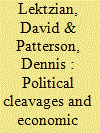

|
|
|
|
|
| Summary/Abstract |
We develop and test a theory, based on the Stolper–Samuelson Theorem, of the effectiveness of sanctions. We treat sanctions as exogenously imposed changes in a country's exposure to international markets. In a country with an open-trade regime, owners and intensive users of the abundant factor of production hold economic and political power. In a country closed to trade, however, economic and political power rests with owners and intensive users of scarce factors. Thus, if real rates of return to the abundant factor decline during sanctions against a trade-open country, or real rates of return to the scarce factor decline during sanctions against a trade-closed country, we expect these economically and politically powerful segments of the targeted country to push hard for policy changes that would bring about an end to sanctions. Statistical analysis of sanctions episodes initiated between 1971 and 2000 provides support for the paper's expectations.
|
|
|
|
|
|
|
|
|
|
|
|
|
|
|
|
| 8 |
ID:
083441


|
|
|
|
|
| Publication |
2008.
|
| Summary/Abstract |
This article argues that the systemic security environment influences the structure of domestic political and economic institutions. If states have been primarily created to protect one group from predation by another, then the state may visibly change as external threats rise and fall. The authors argue that political elites respond to threatening environments by enhancing the ability of the state to extract resources from society in order to protect itself. Using data from the Armed Conflict Dataset, Banks's Cross National Data Archive, and COW data from 1975 to 1995, the authors find evidence that supports the conjectured relationship between threat and state strength. As a response to a more threatening environment, the authors find that states significantly increase their capacity in terms of revenue, government spending, and military spending, but they do not easily relinquish these gains. The authors also observe that nation-state security is heavily influenced by regional regime-type patterns. State capacity increases as the regional neighborhood becomes increasingly autocratic. This suggests political elites not only regard violent conflict in the region as a serious concern to national security, but also appear to consider political change a threat as well
|
|
|
|
|
|
|
|
|
|
|
|
|
|
|
|
| 9 |
ID:
101619
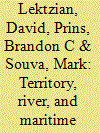

|
|
|
|
|
| Publication |
2010.
|
| Summary/Abstract |
Issues remain at the core of armed conflict. Territory, in particular, appears to increase substantially the probability of inter-state violence and is concluded by many to be one of the most critical correlates of war onset. While scholars have called for an issue-based approach to the study of international relations for some time, recent data collection efforts allow the emergence and management of contentious issues over time to be studied more directly. Our argument and evidence suggest that territory is not necessarily contentious by itself, but is contentious in dyadic contexts characterized by rivalry. Using data from the Issue Correlates of War project, which codes specific government assertions of ownership to territory, river, and maritime locations, we find strategic rivalry, coupled with territorial claims, produces some of the most conflict-prone dyads. Further, jointly democratic domestic institutions do not appear to reduce the hazard of violent conflict over territorial issues within the context of rivalry, although they substantially reduce the hazard of violent conflict among states outside the context of rivalry.
|
|
|
|
|
|
|
|
|
|
|
|
|
|
|
|
|
|
|
|
|